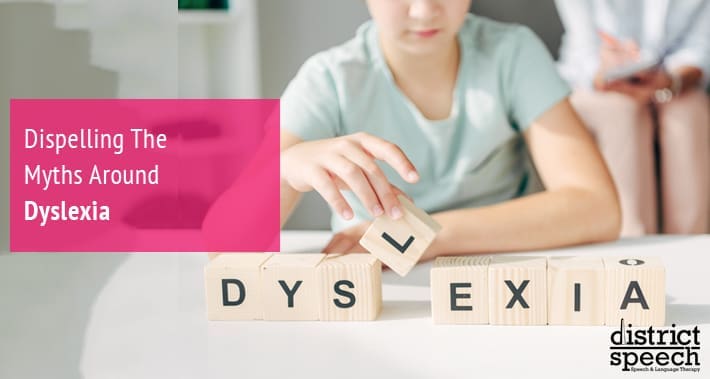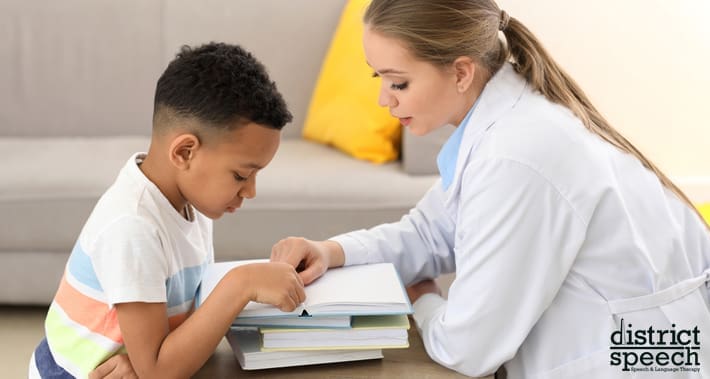
There are all kinds of myths surrounding dyslexia, many of which can be harmful to your child if they are dyslexic.
Your child may feel like they’re falling behind and think it’s their fault.
Maybe they’ve heard from others who don’t understand that they simply aren’t trying hard enough to learn how to read.
As a parent, you’ll want to have all the right tools at your disposal so you can help your dyslexic child navigate their learning.
You might even want to consider learning disability speech and language therapy for your family.
Whatever comes next, you don’t have to navigate this condition alone.
Let’s dispel some of the common myths about dyslexia, and tell you what’s right, instead.
You Can’t Tell A Child Is Dyslexic Until They Start School
Many people think you can’t tell if a child is dyslexic until they start elementary school, and some even go as far as saying you can’t tell until they’re in the third grade.
Why it’s False
Children start developing their reading and language skills well before elementary school.
In fact, it can be more challenging for your child if their diagnosis comes later.
If you’re aware of the warning signs, you may notice if your child is dyslexic much earlier than the third grade.
What’s The Truth?
The truth is that kids with dyslexia can be diagnosed as early as five years old.
A combination of family history and noticing your child’s difficulties will be key in recognizing their dyslexia earlier.
If your child is in preschool, you might notice they have trouble with rhyming words, or maybe they’ve started talking later than their peers.
Dyslexic Kids Just Need Glasses
While it may seem logical that issues with vision would lead to struggles with reading and writing, there is no link between dyslexia and kids who need glasses.
Why it’s False
If your child needs glasses that doesn’t mean they’re any more likely to have dyslexia than other children.
Therefore, if you’re worried that your child might have dyslexia, getting their eyes checked isn’t the right place to start.
Vision problems are unrelated to the kinds of trouble with visual processing that a dyslexic child has.
What’s The Truth?
While not a vision problem, people with dyslexia may have trouble with visual processing.
That’s a disconnect between your eyes and the brain – it has trouble recognizing the details in the data your eyes are receiving.
This disconnect is what causes issues with reading and comprehension, so it’s not a problem with your child’s eyes.
Dyslexia Is Just Writing Letters Backwards
One of the most stereotypical assumptions about dyslexia is that it involves writing letters backwards, but that’s not always the case.
Why it’s False
While some children with dyslexia do write letters backwards, others don’t.
This also means that if your child is writing backwards it doesn’t necessarily mean they have dyslexia.
It’s only the combination of backwards letter writing with other signs of dyslexia that may indicate your child has this condition.
What’s The Truth?
The truth is that many children write letters backwards when they’re learning to write.
Letters that have similar shapes can especially be culprits when starting out – like mixing up the letters “d” and “b.”
While on its own this is not an indication of dyslexia, if your child is still writing letters backwards by the end of first grade, you may want to consider getting them an evaluation.
Your Kid Will Grow Out Of Their Dyslexia
We all hope that the struggles our kids face will just be a phase, but that’s not the case with dyslexia.
Why it’s False
Dyslexia is a lifelong condition that cannot simply be outgrown.
Many people even think that learning to read makes dyslexic issues disappear, but that is not the case.
While many people with dyslexia will learn to read, reading may never feel automatic or natural to them.
What’s The Truth?
Dyslexia is a learning difference that will last your entire life.
Early intervention can help a lot when it comes to issues that arise from dyslexia.
If your child has dyslexia they will be navigating it even after they learn to read and write.

Kids With Dyslexia Just Aren’t Trying Hard Enough
It can be frustrating watching your child struggle with their reading, but trying harder will not necessarily lead to different outcomes for dyslexic children.
Why it’s False
Much research, including brain scans, has shown that dyslexic people use a different part of their brain to read and write than other people.
This proves that they are experiencing a difference in brain function.
Being motivated but not having the right tools doesn’t mean your child isn’t putting in enough effort, they might just not know what to do next.
What’s The Truth?
It’s a lack of awareness of this condition that’s the issue here, not your child’s effort.
With the right kinds of instruction your child can learn and make lasting progress with their reading.
A multisensory approach is often ideal, as it can help approach reading from multiple senses, getting at those neural pathways differently.
Dyslexic Kids Are Less Intelligent
As with many learning disabilities, there’s a common misconception that dyslexia is linked with a lack of intelligence, but this is not the case.
Why it’s False
Many people associate the ability to read with intelligence, thus creating this misconception.
Some people even believe that gifted children cannot have dyslexia.
While your child may indeed face unique barriers, that is no indication of their intelligence.
What’s The Truth?
The truth is that people of all different intelligence levels can have dyslexia.
Despite the struggles that dyslexia may present, your child can go on to do the same things as their peers.
People with dyslexia go on to become actors, politicians, writers, and everything in between – and that means your child can, too.
Your Child Is Dyslexic Because You Didn’t Read To Them
If you’re a parent you may hear from others that they think you haven’t read to your child enough.
Why it’s False
While it’s important to read to your child as they grow, dyslexia is not linked to a lack of exposure to reading.
Dyslexia is a neurological condition, not something that can be mitigated with exposure.
Try to remember that the obstacles you and your child are not the fault of either of you.
What’s The Truth?
When it comes to reading and dyslexia, it can actually be counterproductive to read to your child.
They may continue to memorize patterns and pick up what you’re reading via context clues without every addressing the underlying issues.
Reading development in children with dyslexia needs to be fostered very deliberately with tools for their specific needs.
Book Your Appointment With District Speech Today
Are you looking for more tools to help your child navigate their dyslexia?
At District Speech, we’re here to help your family get the tools you need to navigate this challenge.
If you feel like you need extra support, look no further. With speech language therapy, you can help your child develop skills to manage their dyslexia.
Book your appointment with District Speech today to get started.
1300 I St NW, Suite 400 E,
Washington, DC 20005
- https://g.page/districtspeech
District Speech and Language Therapy specializes in speech therapy, physical therapy, and occupational therapy solutions, for both children and adults, in the Washington D.C and the Arlington Virginia areas.